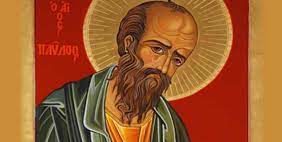Anne Lastman
To bring into perspective the whole question of conversion and hence St Paul’s conversion experience and the problems associated with a person’s ability to perceive and accept God’s intervention in a human life, will be fruitful to review St Paul’s conversion experience both from a theological perspective and from a psychological perspective. Much can be known about this experience of Paul if analysed not only as a historical event which I believe it was, but also from a psycho spiritual perspective.
An analysis of the whole event and the characters involved in this event and perhaps even the setting of this event will be able to elucidate for us some information about the conversion experience itself but also its effects on St Paul’s future life. Only by being able to analyse this episode can we then be able to see how deeply different and life changing the experience really was.
The role of psychology is to attempt to describe the being of the person at the time of the experience and to look at the psychological predisposition of the individuals involved and hence come to an appreciation of the motivations which underlie future determined behaviour.
An individual’s spiritual/religious relationship is governed and conditioned by the dynamics which motivate the individual’s total relationship cache. This is especially true of an individual’s relationship with God because God is not only relationship partner but also Lord, and this in itself brings new dynamics of association.
A religious/spiritual relationship is both a personal relationship, love relationship yet a relationship based on equals and unequals. Equals because a love relationship calls to love by both parties and unequal because this particular relationship is based upon human and divine person. It’s a love relationship because it reveals a human’s profound and at times unconscious inclination towards the other and also the fears, the desires and defences which characterise the human and his/her personality.
An analysis of St Paul’s behaviour and response to the “incidence” or conversion experience on the Road to Damascus (Acts 9:4-9) should help us in determining what occurred and may perhaps help us to understand his subsequent psychology and theology. It may further help us to understand his future relationships with key characters of the nascent church and more than this his relationship with Jesus whom he had so extraordinarily encountered.
By such analysis it would be possible to better understand the conversion of St Paul and to see it as an experience so out of the ordinary that even his somatic being had been unprepared for it.
An examination of our next encounter with Saul/Paul alerts us to the reality and the depth of feeling he had for the Torah. He is so incensed with those who would profane the beliefs and faith of his people that he is willing to “murder” (go against the 5th commandment). This is not zeal for the Torah but zealotry for the Torah. An almost impenetrable hatred appears to have emerged in his character. There appear no concrete acts of charity which characterise the person who is in possession of himself and who is therefore capable of an authentic human response in respect to the values and rights of God and neighbour (Shemah Israel –Deut. 6:4-6). Indeed, at this stage Saul does not even resemble one who observes the Law perfectly because to observe the law perfectly means to obey all the commandments. He appears as someone who spends his life ostensibly at the service of the Torah without ever wavering in that service. He observes the law perfectly according to his own belief (forgetting thou shalt not kill) and his right to protect the Torah.
When looking at the character of Saul/Paul one is struck by the fact that this man appears cold and merciless. He is intent on the job being done and is willing to kill both men and women in the service of his beliefs. This further calls into question his own “Shemah,” for in the Shemah he is encouraged to love God and neighbour. Yet there is a steely cold demeanour towards others now, especially those of “the WAY” his former brothers and sisters. One is also struck by the reality that Saul is not behaving in a rabbinic manner but rather as a “servant” who tries to lead the errant back to Jerusalem. To Jerusalem? Why?
Perhaps so that the errant ones may be brought back into the fold of Torah? Into the Feast of the covenanted ones? In Saul there is a decided lack of humaneness and a coldness which does not bode well for the Law.
The type of perfection that Saul/Paul appears to have achieved seems to be his idea of the Torah Ideal which instead of freeing him to love has actually closed him to love. The ideal so obsesses him that he cannot even see that his ideal is being violated by himself. His ideal sacrifices every desire that he has as a human being and sets him up for a certain confrontation. The perfectionism of Saul is set to encounter the Joy of Jesus and collide because they spring from different wells.
Saul in his protestations against the “NEW WAY” the new group of believers has set himself up as the “righteous” man with an identity pleasing to himself and he supposes to his His God. However, this is anti religious because in his modifications of his self he makes God the instrument of his own ideals and indeed moves far from the intention of God. Saul as the perfectionist of Judaism suppresses all faults in himself and his peoples. He believes that in suppressing all faults God will look upon him favourably and indeed believes that God can only desire fault free human in order to be acceptable.
Saul’s actual experience.
We first encounter Saul standing by and holding the garments of those stoning Stephen who has been accused of blasphemy and summarily dismissed as guilty and immediately ordered to be stoned. We are told that “the witnesses’ laid their garments at the feet of a young man name Saul” (Acts 7: 58)
We are also told that as Stephen prayed the prayer of Jesus “Lord do not hold this sin against them” (Act 7.60) and died with Saul was consenting to his death (Acts 8:1) We next encounter Saul on the road leading to Damascus. however, we are also told that he was still “breathing threats and murder against the disciples of the Lord “(Acts 9.1) and whilst breathing these threats he set off towards Damascus in order to clear out the synagogues and city of this new pestilence called “The Way (Acts 9:2)” It’s interesting that Saul was going to bring these dissidents from the Torah “bound” back to Jerusalem. (Acts 9:2).
The actual encounter with Jesus appears very brief. However, much can be gleaned from the paucity of words. There was a light from heaven. There was a voice from heaven which Saul heard as a voice, but the others heard as thunder (we are reminded of Baptism of Jesus). There was a dialogue between Saul and the unseen voice. There was a question-and-answer period. And there was introduction and instruction. Following the encounter Saul rose from the ground and realised that he was blind and had to be led by the hand and brought into Damascus. And following this for three days he was without sight and neither ate nor drank.
The ensuing story tells of Ananias and the Lord’s conversation with Ananias to bring Saul/Paul to healing and to instruct him on what will be a much-changed future as Ananias is to heal him and to thus fill him with the Holy Spirit (Acts 9:17) and immediately his eyes were opened and he was able to see. He was baptised and was given something to eat (reminds us of people Jesus resurrected and his command to give them something to eat. Raising daughter of Jairus, Lazarus etc). Following this, he was with the disciples for several days and proclaimed Jesus “He is the son of God” (Act 9:20) and confounded the Jews who lived in Damascus, by his declaration that Jesus was the Christ.
It’s first of all important to analyse the attitude of St Paul from the time that we encounter him as a zealot for the Torah (Acts 8:1) and Saul who was consenting to Stephen’s death. In consenting to his death standing by with the garments of the stoners at his feet reveals much about the Saul (student and a true Hebrew son). In this scene it’s clear that the attitude of Paul is one of uncompromising refusal and aggression towards the other person. He is prepared to wait and see out and affirm his peoples’ actions against Stephen. He does not appear to have anything against Stephen himself. He appears to be totally immersed in his own beliefs about the Torah and the honour due to it. Hence his manner of being and acting is determined to be both negative and positive aspects of his life. The negative being that anything which he believes blasphemes the Torah is worthy of death and the positive being his faithfulness to what he believes to be the truth and with this strength Jesus deemed that Paul would be strong and faithful in carrying the new way into the distant world and apostle to the gentile world. “I have other sheep that are not yet of this sheep pen and these I must being in also. They too will listen to my voice and there shall be one flock and one shepherd” (Jn 10:16). Apostle to the gentiles.
The apostle for the new world would need to be strong and courageous just as he was strong in his espousal of the Torah. Saul’s encounter was so real that it was possible to radically change the murderous Saul into Paul of passion for the Lord who encountered him and spoke to him and told him to stop persecuting him.
It has been said that St Paul cannot be considered an apostle because he did not actually see Jesus in human form, and indeed this appears true from what we know, but Paul saw in the better way. The way of the transfiguration like Peter James and John. The way of the Resurrection, and the way of the Ascension and the way of meeting his apostles by the sea shore. Different but the same.
St Paul’s psychology underwent a transformation so complete that he was ready to die for the one who called on him to stop persecuting Him and hence the new people on the new journey. Who he knew he needed and would also be called to suffer.








